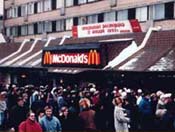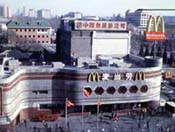Commentary/Dilip D'Souza
Western cheap turns into Indian chic
 It's coming, but nobody seems to know precisely when. Or where.
Will Bombay's new McDonald's restaurant be in my suburb of Bandra?
Or will it be somewhere in the business district of south Bombay,
perhaps gladdening the hearts of Rediff's fast-food-chomping crew?
Good old Ronald McDonald, or his Indian partners, or both, are
keeping it a dark secret.
It's coming, but nobody seems to know precisely when. Or where.
Will Bombay's new McDonald's restaurant be in my suburb of Bandra?
Or will it be somewhere in the business district of south Bombay,
perhaps gladdening the hearts of Rediff's fast-food-chomping crew?
Good old Ronald McDonald, or his Indian partners, or both, are
keeping it a dark secret.
I don't know why. It's not as if those golden arches are going
to spring up somewhere overnight, surprising the neighbours no
end. Nor is it likely to be a target of enemy bomb attacks, so
it's better kept under wraps. Though Ronald's great rival, the colonel
from Kentucky, has seen his Bangalore restaurant vandalised for
political gain. Maybe that weighs on Ronald's mind.
But there you are. McDonald's is coming to India soon. Our lives
are going to be enriched, in more ways than one, as we consume
Chicken McNuggets, steaming hot apple pies, precisely cut and
fried fries. But no Big Macs. And we don't yet know where this
icon of America is going to show up.
I suppose it doesn't really matter where the restaurant will be.
But you connoisseurs of fine McDonald's cuisine around the globe
might be baffled by their menu in India. You may wonder why we
will be deprived here of their best-known item, the Big Mac, as
well as some others. Well, wonder no more. Hindus don't like the
slaughter of cows; Muslims find pigs unclean. Not wanting to offend
sentiments among followers of either of the two major religions
in the land, McDonald's has decided not to serve any beef or pork
items in its Indian restaurants.
So much for that. So if you're visiting India next year and you
think you will have a sudden craving for a juicy Quarter Pounder
with cheese, you should bring one with you.
 McDonald's is the latest in a long series of foreign brand names
that are flooding into India. The flow began when we began the
so-called liberalisation of our economy five years ago. Since
then, an initial trickle has turned into a flood that promises
to blossom into an avalanche soon. Consider some of the names
that we see around us today: Reebok, Tiffany's, Baskin-Robbins,
Audemars Piaget, KFC, Pepsi, 3M, Canon, Ford, Deloittee Touche,
Levis, Timex, Daewood and Teacher's. And now McDonald's.
McDonald's is the latest in a long series of foreign brand names
that are flooding into India. The flow began when we began the
so-called liberalisation of our economy five years ago. Since
then, an initial trickle has turned into a flood that promises
to blossom into an avalanche soon. Consider some of the names
that we see around us today: Reebok, Tiffany's, Baskin-Robbins,
Audemars Piaget, KFC, Pepsi, 3M, Canon, Ford, Deloittee Touche,
Levis, Timex, Daewood and Teacher's. And now McDonald's.
Notice a pattern? Don't try too hard, there isn't any. From cards
to watches, from financial services to ice cream and liquor, big
international companies have caught sight of one of the last really
enormous untapped markets in the world: India. Nearly every day,
there is news of one more firm that is setting up operations here.
Not all of them are as peculiarly secretive as McDonald's is.
But there are some curious ironies about this march into India.
Take Baskin-Robbins. Without intending slander, and writing with
some expertise in matters icy, I submit that Baskin-Robbins is
one of the least desirable ice cream brands in the USA. Ice creams
like umlaut-enriched Haagen Dazs, Texas's own Blue Bell and Ben
& Jerry's are creamier, fruitier and nuttier. All taste far
better than Baskin-Robbins, whose major virtue is being cheap.
That's been turned on its head in India. Baskin-Robbins remains
an also-ran as far as taste goes: to confirm that, try Natural's
or Vrindavan when you visit Bombay. But at thirty rupees a scoop,
Baskin-Robbins is far from cheap. It is really the premium brand
here.
Not only that; its gleaming parlours -- only to be found
in the more upscale parts of town -- with their hip music and
decor, are the cool places to take a date or just hang out. The
smart college set, young executives -- these are the people who
down the 31 flavours.
Western cheap turns into Indian chic, you see. And in fields other
than ice cream as well. Some weeks ago, The Sunday Times carried
a critique of still another car that's about to hit Indian roads,
the Ford Escort.
 I learned from the article, with some surprise,
that the Escort is the newest entarnt into the 'prestige
segment' of the Indian market. By which I presume the writer
meant it is considered a premium, luxury car.
I learned from the article, with some surprise,
that the Escort is the newest entarnt into the 'prestige
segment' of the Indian market. By which I presume the writer
meant it is considered a premium, luxury car.
Again without intending slander, this is quite at variance with
the image the Escort has in its home, the USA. Like Baskin-Robbins
among ice creams, the Escort is sold there as a cheap car with
minimal frills. And even in that part of the selling spectrum,
such competitors as the Honda Civic and the Toyota Corolla are
known as higher-quality, more trouble-free cars. In fact, it was
my test-drive in a brand new Escort some years ago that rapidly
convinced me I should buy a Civic.
But in India, the Escort is in the 'prestige segment'
Its ads make a big thing of the claim that it is the world's largest-selling
car. Nobody has stopped to ask how the car owned by the most people
can be called prestigious.
As if to complement the phenomenon of products going upscale when
they come to India, there are some which start upscale and remain
there. And that raises questions too.
There's the high-priced wristwatch: Audemars Piaget. I imagine
few Indians had heard of this name even a year ago. But now that
they are sold here, how many Indians will be able to buy these
fancy timepieces? You could ask the same question about Reebok
shoes, Canon cameras or several brands of scotch whisky. You could
ask it of Tiffany's shiny baubles, greeted with extensive and
fawning press coverage when they appeared in Bombay recently.
You'd get a simple answer. A lot.
Somewhere in all this, it seems to me, lie some of the twisted
paradoxes of modern India.
Consider: An overwhelming majority of Indians cannot now and will
never be able to afford Tiffany's trinkets. But in India, even
a tiny minority is a lot of people. Certainly enough to tempt
Tiffany's decision-makers to sell here.
Even as McDonald's India chief tells the press that his prices
will be 'affordable to most Indians,' he has to know
that cannot be true. Most Indians cannot afford the restaurants
we already have. How will they pay for a McDonald's meal?
You know from comments like these how strangely divorced people can
get from the reality of India. Then again, so many Indians will
be able to afford McDonald's that the comment makes some bizarre
sense after all; so many, that I have no doubt the new restaurant
will be profitable.
If your thoughts are not confused enough already following this
reasoning, you can always return to the oddest aspect of the entry
of foreign brands. That's the way they move up the desirability
and exclusivity scale when they come to India.
Take my word for it: McDonald's restaurants will attract the same
fashionably dressed gang that Baskin-Robbins does. The brand new
Levi's jeans they will be wearing are sold exclusively at Bombay's
most expensive boutiques. They will drive up very prestigiously
in their Ford Escorts or Daewoo Cielos, yanking out their detachable
Pioneer CD players as they switch their engines off. And as they
munch through their McChicken sandwiches, they will flash, like
Ido, a Timex watch on their wrist.
Maybe you now know why the precise location of that new restaurant
is such a secret. The longer it remains that way, the more heightened
the expectations. The greater the hungering for yummy McNuggets.
The higher the exclusivity factor. The fatter the profits.
Long live capitalism! See you in the line at McDonald's in Bombay.
I'll be in the black Gap jeans. Buy me my favourite, the apple
pie.
|





 It's coming, but nobody seems to know precisely when. Or where.
Will Bombay's new McDonald's restaurant be in my suburb of Bandra?
Or will it be somewhere in the business district of south Bombay,
perhaps gladdening the hearts of Rediff's fast-food-chomping crew?
Good old Ronald McDonald, or his Indian partners, or both, are
keeping it a dark secret.
It's coming, but nobody seems to know precisely when. Or where.
Will Bombay's new McDonald's restaurant be in my suburb of Bandra?
Or will it be somewhere in the business district of south Bombay,
perhaps gladdening the hearts of Rediff's fast-food-chomping crew?
Good old Ronald McDonald, or his Indian partners, or both, are
keeping it a dark secret.
 McDonald's is the latest in a long series of foreign brand names
that are flooding into India. The flow began when we began the
so-called liberalisation of our economy five years ago. Since
then, an initial trickle has turned into a flood that promises
to blossom into an avalanche soon. Consider some of the names
that we see around us today: Reebok, Tiffany's, Baskin-Robbins,
Audemars Piaget, KFC, Pepsi, 3M, Canon, Ford, Deloittee Touche,
Levis, Timex, Daewood and Teacher's. And now McDonald's.
McDonald's is the latest in a long series of foreign brand names
that are flooding into India. The flow began when we began the
so-called liberalisation of our economy five years ago. Since
then, an initial trickle has turned into a flood that promises
to blossom into an avalanche soon. Consider some of the names
that we see around us today: Reebok, Tiffany's, Baskin-Robbins,
Audemars Piaget, KFC, Pepsi, 3M, Canon, Ford, Deloittee Touche,
Levis, Timex, Daewood and Teacher's. And now McDonald's.
 I learned from the article, with some surprise,
that the Escort is the newest entarnt into the 'prestige
segment' of the Indian market. By which I presume the writer
meant it is considered a premium, luxury car.
I learned from the article, with some surprise,
that the Escort is the newest entarnt into the 'prestige
segment' of the Indian market. By which I presume the writer
meant it is considered a premium, luxury car.